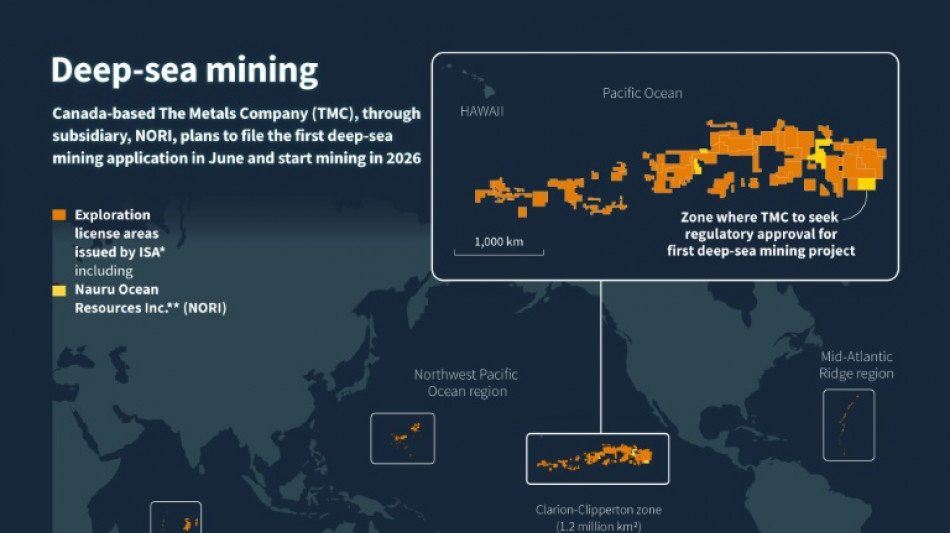
-
 McIlroy, Scheffler and Schauffele together for rainy PGA battle
McIlroy, Scheffler and Schauffele together for rainy PGA battle
-
Uruguay's Mujica, world's 'poorest president,' dies aged 89

-
 Lift-off at Eurovision as first qualifiers revealed
Lift-off at Eurovision as first qualifiers revealed
-
Forest striker Awoniyi placed in induced coma after surgery: reports

-
 'Kramer vs Kramer' director Robert Benton dies: representative
'Kramer vs Kramer' director Robert Benton dies: representative
-
Tatum suffered ruptured right Achilles in playoff defeat: Celtics

-
 US stocks mostly rise on better inflation data while dollar retreats
US stocks mostly rise on better inflation data while dollar retreats
-
Winning farewell for Orlando Pirates' Spanish coach Riveiro
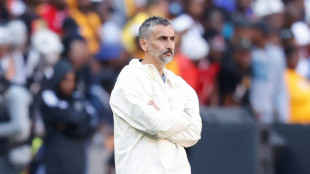
-
 Lift-off at Eurovision as first semi-final takes flight
Lift-off at Eurovision as first semi-final takes flight
-
UN relief chief urges action 'to prevent genocide' in Gaza

-
 Baseball pariahs Rose, Jackson eligible for Hall of Fame after league ruling
Baseball pariahs Rose, Jackson eligible for Hall of Fame after league ruling
-
Scheffler excited for 1-2-3 group with McIlroy, Schauffele

-
 Sean Combs's ex Cassie says he forced her into 'disgusting' sex ordeals
Sean Combs's ex Cassie says he forced her into 'disgusting' sex ordeals
-
Uruguay's 'poorest president' Mujica dies aged 89

-
 Senior UN official urges action 'to prevent genocide' in Gaza
Senior UN official urges action 'to prevent genocide' in Gaza
-
'Kramer vs Kramer' director Robert Benton dies: report

-
 Sinner moves through gears to reach Italian Open quarters
Sinner moves through gears to reach Italian Open quarters
-
Massages, chefs and trainers: Airbnb adds in-home services

-
 Republicans eye key votes on Trump tax cuts mega-bill
Republicans eye key votes on Trump tax cuts mega-bill
-
Brazil legend Marta returns for Japan friendlies

-
 McIlroy, Scheffler and Schauffele together to start PGA
McIlroy, Scheffler and Schauffele together to start PGA
-
Jose Mujica: Uruguay's tractor-driving leftist icon

-
 Uruguay's ex-president Mujica dead at 89
Uruguay's ex-president Mujica dead at 89
-
It's showtime at Eurovision as semis begin

-
 DeChambeau says '24 PGA near miss a major confidence boost
DeChambeau says '24 PGA near miss a major confidence boost
-
Gaza, Trump dominate politically charged Cannes Festival opening

-
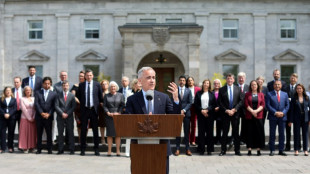 Carney says new govt will 'relentlessly' protect Canada sovereignty
Carney says new govt will 'relentlessly' protect Canada sovereignty
-
Gaza rescuers says Israeli strikes kill 28 near hospital

-
 Schauffele still has something to prove after two major wins
Schauffele still has something to prove after two major wins
-
US inflation cooled in April as Trump began tariff rollout
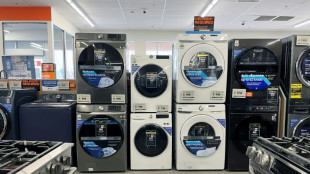
-
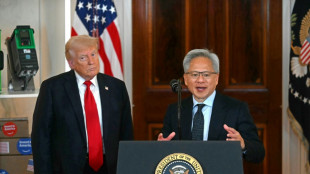 US reverses Biden-era export controls on advanced AI chips
US reverses Biden-era export controls on advanced AI chips
-
Trump, casting himself as peacemaker, to lift Syria sanctions

-
 US Ryder Cup captain Bradley eyes LIV's Koepka, DeChambeau
US Ryder Cup captain Bradley eyes LIV's Koepka, DeChambeau
-
Musetti battles Medvedev and match-point rain delay to reach Rome quarters

-
 Rights groups urge court to halt UK fighter jet supplies to Israel
Rights groups urge court to halt UK fighter jet supplies to Israel
-
Steamy excitement at Eurovision contest

-
 Forest hit back over criticism of owner Marinakis over Nuno clash
Forest hit back over criticism of owner Marinakis over Nuno clash
-
Sean Combs's ex Cassie says he 'controlled' her life with violence

-
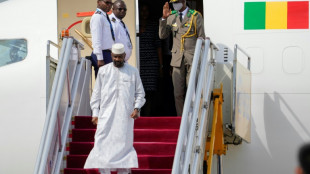 Mali dissolves political parties in blow to junta critics
Mali dissolves political parties in blow to junta critics
-
Blackmore's history-making exploits inspiring to all: de Bromhead

-
 Southern Hills named host of 2032 PGA Championship
Southern Hills named host of 2032 PGA Championship
-
Injury may delay outdoor season start for Norway's Ingebrigtsen

-
 Tour de France to go through Paris' historic Montmartre district
Tour de France to go through Paris' historic Montmartre district
-
'We can't go back': India's border residents fear returning home
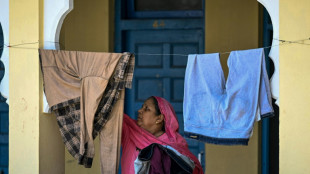
-
 Finland returns sacred stool looted by France to Benin
Finland returns sacred stool looted by France to Benin
-
Israel PM says army entering Gaza 'with full force' in coming days

-
 Sean Combs's ex Cassie says he 'controlled' her life
Sean Combs's ex Cassie says he 'controlled' her life
-
Carney forms new Canada govt to reshape US ties

-
 Everton to preserve Goodison Park for women's team
Everton to preserve Goodison Park for women's team
-
Stocks mixed after cool US inflation and as rally tapers


Why are proposed deep-sea mining rules so contentious?
After more than a decade of negotiations, a new round of talks to finalize a code to regulate deep-sea mining in international waters begins Monday in Jamaica, with hopes high for adoption this year.
The International Seabed Authority (ISA), an independent body established in 1994 under a UN convention, has been working since 2014 on the new rules for developing mineral resources on the ocean floor.
The huge task has gathered pace, under pressure from corporate concerns eager to cash in on the untapped minerals.
Canada's The Metals Company plans to file the first commercial mining license request in June, through its subsidiary Nori (Nauru Ocean Resources Inc.), which hopes to extract polymetallic nodules from the Pacific.
Here is a look at the proposed rules, and why they have sparked intense debate:
- What does this mining code entail? -
Under the UN Convention on the Law of the Sea (UNCLOS), the ISA must both oversee any exploration or mining of coveted resources (such as cobalt, nickel, or manganese) in international waters, and protect the marine environment.
For activists worried about the protection of hard-to-reach ocean ecosystems, this twin mandate is nonsensical. Some groups, and more and more countries, are asking for a moratorium on seabed mining.
With no consensus, the ISA-led negotiations have continued.
The ISA Council, made up of 36 of the authority's 169 member states, will spend the next two weeks trying to bridge the gaps on finalizing the code.
They are working from a 250-page "consolidated text" already riddled with parenthetical changes, and comments on disagreements.
But then there are dozens of amendments filed by countries, companies and non-governmental organizations.
Emma Wilson of the Deep Sea Conservation Coalition told AFP there were "over 2,000 textual elements that are still being discussed -- and that those debates were "not close to being resolved."
- How would seabed mining work? -
Any entity wishing to obtain a contract to mine the ocean floor must be sponsored by a specific country.
Those applications for mining licenses would first go through the ISA's legal and technical commission, which NGOs say is too pro-industry and opaque.
The commission would evaluate the financial, technical and environmental aspects of the proposed plans, and then make a recommendation to the ISA Council, the final decision-maker.
But some worry that rules already set by UNCLOS would make it too difficult to reject any favorable recommendations.
The draft code calls for initial contracts lasting 30 years, followed up with extensions of five years at a time.
- What about environmental protection? -
Potential mining companies must conduct a survey of the possible environmental risks of their activities, but details on these surveys are still up in the air, with negotiators not yet even agreed on how to define the terms.
More and more countries, along with NGOs, highlight that even the idea of surveying potential impact is effectively impossible, given the lack of scientific data about the zones.
And some Pacific states insist that the code explicitly state the need to protect "underwater cultural heritage," but that is under debate.
- What about compliance? -
The draft text calls for inspections and evaluations for deep-sea mining companies, but how such a system would work is under debate. Some even think such mechanisms are ultimately not all that feasible.
- Will there be profit-sharing? -
Under UNCLOS, resources on the ocean floor are seen as the "common heritage of mankind."
The mining code under consideration stipulates that each company must pay royalties to the ISA based on the value of the metals. But what percentage should they pay?
A working group has proposed royalties of anywhere from three to 12 percent, while African states believe 40 percent is more just.
B.Wyler--VB
